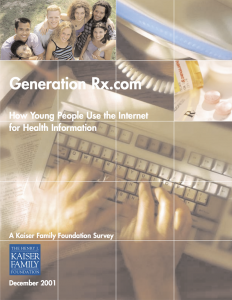Reports & Summaries
Generation Rx.com: How Young People Use the Internet for Health Information
 Full Article Name: Generation Rx.com: How Young People Use the Internet for Health Information
Full Article Name: Generation Rx.com: How Young People Use the Internet for Health Information
Open Access: Yes
Introduction
Over the past five years, there has been an explosion in Internet access and use in the United States. With the growth in Internet use has also come increased attention to the role of the Web as a source of consumer health information. The Internet could help consumers by offering a confidential source of information on sensitive topics. It could improve health outcomes by encouraging healthier lifestyles, better informing patients, and connecting people with similar conditions. On the other hand, increased reliance on the Web could expose consumers to unreliable health information and reduce doctor-patient communication. While adult behavior as online health consumers has been examined, little is known about how young people use the Internet for health information. We know that many adults search the Web for health and medical information – the most recent analysis by The Pew Internet and American Life Project found that 60% of online adults have done so – but we are aware of no other study that has looked in- depth at whether teens and young adults use the Internet for health purposes, and if so, how and to what extent. We know young people are spending more and more time online, but is that time spent mostly on fun and games, or are young people also turning to the Internet for information on their own health and well-being? What types of issues are they researching online, and how do they go about finding the information they need? Do they know who is providing the information, and do they trust what they learn? Does the information they find influence their behavior? For young people in particular, the Internet could be an especially important destination since the health issues that concern them are often sensitive, and many may not have an established relationship with a doctor other than their family doctor. Again, the implications remain unclear. Increased access to health information could create a more informed and healthful youth. On the other hand, if the quality of online information is not high or the source unknown, increased reliance on the Internet could lead to greater misinformation and skepticism. In this report, we begin to address these questions by analyzing the results of a nationally representative, random dial telephone survey of 1,209 respondents ages 15-24, including an over- sample of approximately 200 African American and Latino youth. The survey was designed and analyzed by staff at the Kaiser Family Foundation in consultation with International Communications Research, and fieldwork was conducted by ICR between September 24 and October 31, 2001.
Citation
Rideout, V. (2001). Generation Rx.com: How young people use the Internet for health information. Henry J. Kaiser Family Foundation. https://www.kff.org/health-costs/report/generation-rx-com-how-young-people-use/

